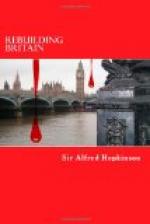Where money is rapidly acquired by some stroke of fortune and is not the result of steady industry the result is constantly unwise and often harmful expenditure either by those who have acquired it or their immediate successors. There is an old Lancashire saying as to fortunes rapidly made, that there are only three generations from clogs to clogs: “What is unreasonably gathered is also unreasonably spent by the persons into whose hands it finally falls.” It may be spent “in a stupefying luxury twice harmful both in being indulged in by the rich and witnessed by the poor.”
There is a great danger to the State at the present time from large amounts of money rapidly acquired being accumulated in few hands. There are many signs that we are likely to enter a period which may be described as the reign of the “nouveaux riches.” The great financiers, the persons with enormous interests in huge combines, will exercise more and more an undue and dangerous influence on fiscal policy and political life. The old nobility and the class of country gentlemen will have less power. Their resources will be seriously crippled, and their families perhaps extinguished through losses in the War. The middle class, which, in the last century, exercised the strongest influence on political life, and from which most of our men of letters and science have sprung, may now be crushed. On the more highly educated part of the middle classes whose means are limited the burden of the War has fallen most heavily. Taxation seems deliberately arranged to place as heavy a burden as possible on those of the middle classes who have children to bring up and to educate in the way they think best, and who endeavour to provide means by which their families can occupy the same position in life which their parents have done. The rate of income tax paid by a bachelor and a spinster is increased if they marry, although their necessary expenses will be enormously increased if they have a family to support. A bachelor with L500 a year may be living in ease and luxury; if he marries and has four or five children to educate he may find difficulty in meeting the needs of his family with L1,500. In the same way the death duties are absurdly small on the estate of the bachelor who leaves no family, but are a real hardship on the family of the man who dies leaving a number of children.




